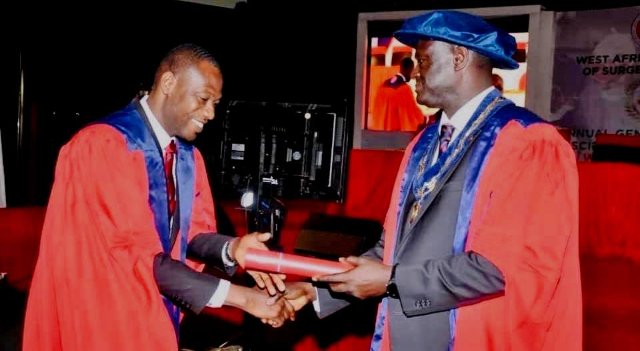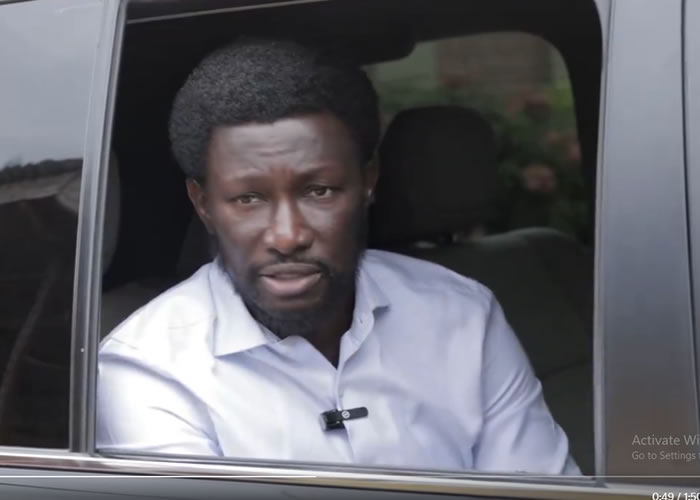Meet Dr Hadi Abdallah: From Nungua Zongo To Internationally Recognised Neurosurgeon
- Home
- Meet Dr Hadi Abdallah: From Nungua Zongo To Internationally Recognised Neurosurgeon

Meet Dr Hadi Abdallah: From Nungua Zongo To Internationally Recognised Neurosurgeon
 Medical school is not an easy feat to conquer and it is twice as challenging for somebody to want to pursue a specialisation such as neurosurgery which was considered absurd in the early 2000s.
Medical school is not an easy feat to conquer and it is twice as challenging for somebody to want to pursue a specialisation such as neurosurgery which was considered absurd in the early 2000s.
However, for Dr Hadi Abdallah, it was a dream worth chasing. For 15 years, Dr Abdallah, trained in medical school and then in neurosurgery to become one of West Africa’s renowned neurosurgeons.
Though his journey which started from the Nungua Zongo community started without hope.
Speaking on Joy FM’s Super Morning Show, Dr Abdallah shared his story.
“I’m one of the few guys to actually have achieved their childhood dream and also achieve my fantasy. People always say I’m always talking about my wife, but it’s rare to be able to get those two in place.
“I come from the Nungua Zongo, and at the time, we didn’t have a university graduate. We only had one person who was in the university. For some reason, I had even never seen a neurosurgeon before but I just dreamt that I want to be a brain surgeon.
“The only other one I heard of at the time was, Dr Mustapha, may his soul rest in peace. Who I was told was probably the first brain surgeon in the whole of sub-Saharan Africa and then, becoming a neurosurgeon was seen as a myth.
“People described him as mystical Moustapha. So for them, it was unusual and people used to laugh at me. Nobody in my community had completed university before. No girl in my family had gone to secondary school apart from my senior sister,” he said.
Coming from a family with 12 children, he said that all the girls who came before his senior sister had never even sat in a classroom before. To his community, it was laughable that he had a dream to become a neurosurgeon but he decided to stay on his mission to achieve his goal, no matter how difficult it got.
However, there was no telling how difficult it would get.
“I never benefited from any of the state scholarships. I paid my own fees, I had to work to pay my fees, in the university and in the medical school.
“After completing Nungua Secondary School, I decided to go back and teach and I made about ¢2000 (old currency) which is now GH¢20p and I used it to build a table tennis board, using plywood and hired it out to make money. I managed. Along the line, some few people, including my teachers, helped to pay my fees.
He is the 10th of 12 children.
“I lost my dad when I was about four years old we went through very difficult moments since then. There was a very bad storm in Accra which removed our roof, my mother was alone. I needed to do something to help her.
“I had been working in Teshie Nungua estates weeding people’s homes, even when he was alive. So I wouldn’t say probably that he would’ve played so much of a role, in terms of finances.
“Weeding people’s homes in Nungua Zongo before the age of four was something very common. We would go to the homes, press the bell and ask ‘do you have a place to weed?’ We weeded and took some money. There were times we went to the bush and used to hunt ‘bela’ (bust rats), rabbit and those things.
“I always have to appreciate my mum. She really did a lot to put us through education. She used to sell waakye and this was a lady who was pulled out of school and married off to my dad at the age of 16 and she had five children [with his father]. All my half-siblings were older than her except the last one who was quite little,” he disclosed on the show.
Hustling had since become a necessity to survive, to have a better life. Though, the strife came with its heartbreaks.
“Unfortunately, I don’t have close childhood friends because I lost all of them. The dream for most of us then was to go to Europe through Libya. Of my close friends then, one of them we have not seen for the past 20 years since he embarked on that journey. Two of the guys have come home so we believe the other is dead.
Another very close friend of mine also tried to go to Italy but this time through as a [ship] stowaway at the port. Unfortunately, he was being chased by the security and he just jumped into the water.
He died and I heard the news whilst I was in school. It’s been almost 20 years now but it’s still painful. That was the life I had to live unfortunately to survive.”
“We never had hope,”
For Dr Abdallah, those stories shaped the next years of his life. It was either he decided to live a hopeless life or to turn that frown upside down for something better. He chose the latter, and his story so far had a purpose.
“I felt I just had to remind people and share their stories. After going through medical school, I’ve managed to change the mindset of our people and we have about five doctors from Nungua Zongo and I’d probably say we have more doctors than greater Nungua itself.
“That is what education can do. That is why I like appearing in the media, I like when they see me and their parents tell them that this guy is from here [the Zongo community]. They really get inspired and it makes a change.
“I want to thank Joy FM for my first interview here, it has really made a significant change. We are no longer trying to go on this treacherous journey through the Sahara desert or through Libya.
Journeying to the UK to work to pay school fees
“I had some small money from the Student Loan from gaining admission to Accra Polytechnic. I took that to pay admission at Legon and then I got a visa to travel.
People thought it was dangerous [to go to the UK] but I said, two of my friends tried going through the treacherous journey through the Sahara desert and they couldn’t make it and some made it.
I thought I’m going to sit in an aeroplane. So I borrowed money and I went.
Every vacation, I went. I’m even lucky. Some didn’t have that.
It was a straight trip from the airport to Telford, I didn’t know anybody. For money to rent a place, I was working about 20 hours a week for like 6 weeks and then I came back [to Legon] to continue my medical school.
I worked in bakeries, sweeping and doing all kinds of jobs.
I didn’t see it as a difficult situation because most of the young guys in my area couldn’t get to go to school and for me to have sat in an aircraft, to go to the UK was really a privilege. I must say it could be that I was the first person to sit in an aeroplane from the community.
For me it was a blessing. And for all those, I didn’t know London very well, I didn’t know Buckingham palace. All I did was straight from the airport and then work.
I just went there to hustle to pay my fees.”
Making a historical change in medical practice
To say the least, his journey had just begun.
He became the President of the Junior Doctors Association after Medical School when his predecessor was impeached for an undisclosed action.
In his new role, he ruffled a few feathers and made room for both pluses and minuses.
“I’ve not really regretted why I joined. Just before I completed my medical school there was always this discussion about doctors leaving Ghana. In fact, my year group, more than half of the graduates left Ghana either for the US or the UK. Only two people remained in this country.
The doctors’ salary at the time for any qualified doctor was GH¢150 which was around 2005 and 2006. A specialist was taking around GH¢200 – GH¢250.
We had what we called the additional day allowance rate which was an irregular payment. In 2006 it was cancelled. Only a few doctors had cars they could drive to work. They also had then stopped feeding doctors on duty at Korle Bu Teaching Hospital.
My class actually had a leader but we felt we probably at the time connived with authorities to stop the feeding. That’s what I suspected. He was impeached and I was selected to become the leader.
Within a week [of becoming President] I had to declare a strike at Korle Bu; some of my colleagues had to faint at work. The idea about the feeding was that there was an opportunity to go to the restaurant to buy food or they should bring food to you. That had been there till Professor Frimpong Boateng tried to cancel it. But we got it restored.
The next thing was, I felt we had to change the perception that people always tried to go out after medical school and we needed to fight for that. So we threatened to strike, the Ghana Medical Association never supported it.
So I was virtually standing alone. I had several discussions. I was also called when we were on strike and met the President of Ghana at the time who was John Agyekum Kuffuor and we negotiated.
I was looking for $2,000 for doctors which was almost about GH¢2000 [equivalent] at the time. Everybody believed it was quite preposterous from GH¢150 to GH¢2000 and they assured me they were trying to bring a new salary structure.
We didn’t believe them.
For GH¢2000 doctors insulted me, ‘and asked how can you say doctors should be paid 2000?’ We pushed for it and eventually, it came down to GH¢1670.
Having achieved that, it sparked a series of strike actions in various unions in this country. So the government felt hurt by what I did. Doctors who were in the GMA, some occupying high positions said what I did was wrong and they targeted me. But I have not regretted it because at the end of it, doctors are slightly comfortable and many are staying[in the country].”
Out of the 17 neurosurgeons to be trained in West Africa to be trained, Dr Abdallah comes from 11 that have been trained in Ghana.
“I was extremely inspired by one Dr Idrissu. I’m the 11th neurosurgeon he’s trained for Ghana. He was a true mentor. He inspired me to believe that things could get better.”
It took him about 15 years to become a neurosurgeon. Three years more than the average time spent on specialising in neurosurgery in the country.
“Three years of my life was wasted because some people felt that I shouldn’t be allowed to specialise, even after I decided to stay here to specialise because of what I did in 2006.
I wrote the exams, passed to start the programme for the interview and it was confirmed just this past Saturday by a state official that I actually topped the interview exams for admission to the postgraduate programme.
Some people said ‘no, over their dead body’ and I was asked to apologise to some people before I was allowed to start the programme, so I got a lawyer.
I apologised to them and they laughed; they teased me. Some of my closest friends are aware of what happened. I was kicked out of Korle Bu and then went to Winneba.
In Winneba, I tried to change things, we were seeing a lot of accident cases. I got frustrated at a point in time and decided to go and read law. I wrote the law school exams, passed and started law.
When there was a change in government and the director was removed, I applied and I was picked and that is how we are here today. There were some periods where I came home, and I felt like giving up, [the training] is so difficult. You spend virtually all your life in the hospital whilst under training and you have to prepare slides and do presentations virtually every week.
The fact that that was my childhood dream and I was almost getting there, I thought I must finish it up. Because there were a lot of young people in Nungua Zongo looking up to me. I needed to set a very high standard for them. So for all of them who read medicine, it’s non-negotiable – all of them must specialise and I’ve tried to encourage them to do that.
For me, it will help the community, and with time our generation will take poverty out of the community.”
Source: Myjoyonline.com
- Share
Classic Ghana
Classic Ghana brings you into a fun world of arts, entertainment, fashion, beauty, photography, culture and all things in between. Let’s explore these together!







